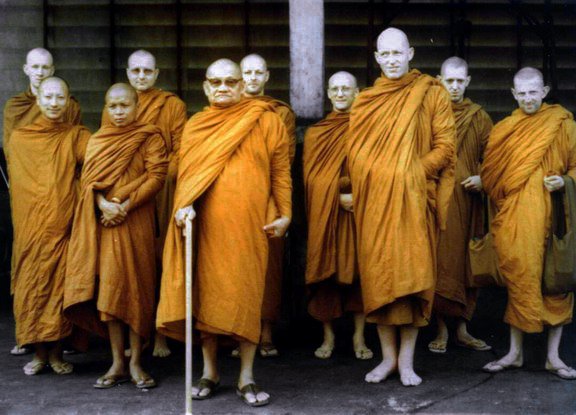Ajahn Sumedho was born in the USA, became a bhikkhu in 1967 and trained nine years under Ajahn Chah at Wat Pah Pong, a forest monastery in Ubon province, Thailand.
Ajahn Sumedho is one of the senior Western representatives of the Thai forest tradition of Theravada Buddhism. He was abbot of Amaravati Buddhist Monastery, UK, from its consecration in 1984 until his retirement in 2010. He is an honorific and term of affection in keeping with Thai custom; ajahn means teacher. A bhikkhu since 1967, Sumedho is considered a seminal figure in the transmission of the Buddha's teachings to the West.

Ajahn Sumedho was born Robert Karr Jackman in Seattle, Washington, in 1934.
During the Korean War he served for four years from the age of 18 as a United States navy medic. He then did a BA in Far Eastern studies and graduated in 1963 with an MA in South Asian studies at the University of California, Berkeley.
After a year as a Red Cross social worker, Jackman served with the Peace Corps in Borneo from 1964 to 1966 as an English teacher. On break in Singapore, sitting one morning in a sidewalk café, he watched a Buddhist monk walk by and thought to himself, "That looks interesting."
In 1966, he became a novice or samanera at Wat Sri Saket in Nong Khai, northeast Thailand. He ordained as a bhikkhu (Buddhist monk) in May the following year.
.jpg)
From 1967 to 1977 at Wat Nong Pah Pong, he trained under Ajahn Chah. He has come to be regarded as the latter's most influential Western disciple. In 1975, he helped to establish and became the first abbot of the International Forest Monastery, Wat Pa Nanachat in northeast Thailand founded by Ajahn Chah for training his non-Thai students.
In 1977, Ajahn Sumedho accompanied Ajahn Chah on a visit to England. After observing a keen interest in Buddhism among Westerners, Ajahn Chah encouraged Ajahn Sumedho to remain in England for the purpose of establishing a branch monastery in the UK. This became Cittaviveka Forest Monastery in West Sussex and Amaravati Buddhist Monastery in Hertfordshire in 1984.

During his thirty-four years of being based in Britain, he taught extensively throughout the world, has inducted more than a hundred aspirants of many nationalities into the samaṇa life, and also authorised the establishment of six other monasteries.
